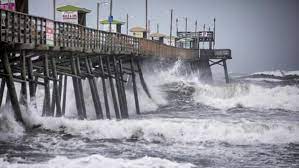Continuing University of Guelph professor Ross McKitrick’s look at Steven E. Koonin’s landmark book Unsettled: What Climate Science Tells Us, What it Doesn’t, and Why it Matters.
Everybody’s heard that storms and hurricanes are becoming more common and more severe, and greenhouse gases are going to make it all worse. But what everybody doesn’t hear is those claims are groundless. And at the heart of the problem are the various official “assessment reports”, which Koonin says present a summary “spin” inconsistent with their own findings, and of the underlying research. In chapter 6 of Unsettled, “Tempest Terrors”, Koonin begins with a scary headline claim about Atlantic hurricanes in the 2014 US National Climate Assessment, which was coupled with a scary chart showing them trending upward after 1980. Then he shows the text of the report stated the opposite, as did the paper on which the claims were allegedly based. So what is actually scary here is the extent to which government agencies are willing to misrepresent things.
The 2014 National Climate Assessment showed a graph with a strong upward trend in hurricane strength beginning in 1980. But the underlying paper, Koonin discovered when he checked into it, said “there are no significant trends beyond natural variability in hurricane frequency, intensity, rainfall or storm surge flooding” (emphasis in original). So he went back to the government report and kept reading. Notwithstanding the fact that the headline message in the summary was that storms were getting more severe and numerous, buried in a back appendix was this statement:
There has been no significant trend in the global number of tropical cyclones nor has any trend been identified in the number of US landfalling hurricanes.
So which is it? It turns out the message in the back pages was the one supported by the science, including previous IPCC reports and published scientific papers, while the summary message was a falsehood.
The next National Climate Assessment, in 2017, did exactly the same thing. It put a weasely statement in the summary that insinuated human activities were causing more and more hurricanes. But in the detailed sections deep in the report it admitted they were not confident there even were any upward trends. And the National Academy of Science panel that reviewed the section, instead of calling them out, suggested they focus attention on the short section of the data with an upward trend.
It is not just government science bodies that mislead. Koonin discusses another study that looked at satellite data and found a slight upward trend in hurricanes in the North Atlantic, which also said the causes were not understood and could be due to natural variability. But when USA Today reported on the story they waived away the caution and declared “Human-caused global warming has strengthened the wind speeds of hurricanes, typhoons and cyclones around the globe.”
Having established the plainly dishonest nature of hurricane reporting, Koonin goes on to look at US tornado activity. Tornadoes are mysterious creatures, and while it is known that they are spawned by thunderstorms, it is not clear why it happens at some times and not at others. Which obviously means they can’t be predicted far in advance which in turn means it’s not possible to predict whether warming will cause more of them or not. And indeed the IPCC has avoided making such projections, largely because they recognize their models don’t simulate them with any accuracy. But as Koonin shows that doesn’t stop the press from running regular stories insinuating that greenhouse gases will make tornadoes worse.
There are some areas of climate science where we should give the experts the benefit of the doubt since they are dealing with complex, difficult subjects. But Koonin’s chapter shows that, on the issue of storms, hurricanes and tornadoes, the scientists and journalists who prepare the high-profile reports and splashy news articles don’t deserve the benefit of the doubt. They are untrustworthy, and they have misled us so often we can no longer take anything they say at face value.
Next issue: Precipitation perils.



Ross McKitrick’s summary of Steven Koonin’s chapter 6 is perfect. It clearly and briefly presents Koonin’s findings of the falsehood of increasing trends in the number and severity of hurricanes and tornadoes propagated by some scientists and most journalists.